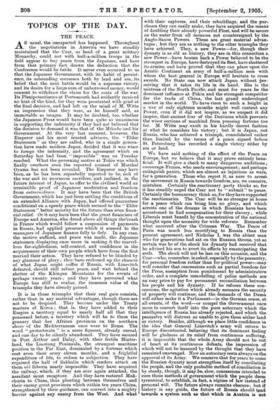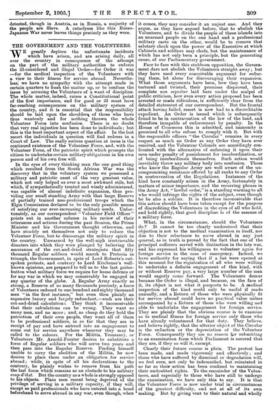THE PEACE.
TOPICS OF THE DAY.
AS usual, the unexpected has happened. Throughout the negotiations in America we have steadily maintained that the Czar, as head of a great military Monarchy, could not with half-a-million troops in the field appear to buy peace from the Japanese, and have from that primary fact drawn the deduction that the Conference would be futile. It never even occurred to us that the Japanese Government, with its habit of persist- ence, its astounding successes both by land and sea, its belief that the next battle would be a supreme victory, and its desire for a large sum of unborrowed money, would consent to withdraw the claim for the costs of the war. Its Plenipotentiaries at Portsmouth had evidently received no hint of the kind, for they were prostrated with grief at the final decision, and had left on the mind of M. Witte an impression that they were, as he himself said, as immovable as images. It may be doubted, too, whether the Japanese Press would have been quite so unanimous in supporting the indemnity if they had not believed that the decision to demand it was that of the Mikado and his Government. At the very last moment, however, the Emperor and his most trusted advisers, the "Elder Statesmen" as they are called, who in a single genera- tion have made modern Japan, decided that it was wiser to forego the indemnity, and the agreement which on Saturday last had been " impossible " was on Tuesday reached. What the governing motive at Tokio was which finally overbore even the reported counsel of Marshal Oyama has not been revealed. The Emperor may have been, as he has been repeatedly reported to be, sick of the war and its enormous sacrifices, and inclined, in the future interest of Japan, to offer to the civilised world an irresistible proof of Japanese moderation and freedom from autrecuidance. It may have been that the British Government, which has just been settling the conditions of an extended Alliance with Japan, had offered guarantees conditional on a speedy peace which seemed to the "Elder Statesmen" better security for the future than even finan- cial relief. Or it may have been that the great financiers of Europe and America, who dread above all things the'crash in France which would follow a suspension of payments in Russia, had applied pressure which it seemed to the managers of Japanese finance folly to defy. In any case, the motive sufficed, and peace was made, the Japanese statesmen displaying once more in making it the marvel- lous far-sightedness, self-control, and confidence in the acquiescence of their own people which have from the first marked their action. They have refused to be blinded by any glamour of glory ; they have reckoned up the chances of what Japan might suffer if Russia, with Linevitch defeated, should still refuse peace, and wait behind the shelter of the Khingan Mountains for the events of perhaps twenty years ; and they have perceived what Europe has still to realise, the immense value of the triumphs they have already gained.
It is in those triumphs that their real gain consists, rather than in any material advantages, though these are not to be despised. They become under the Treaty masters of Korea ; that is, they have added to their Empire a territory equal to nearly half all that they possessed before, a territory which will be to them the granary that her African provinces on the southern shore of the Mediterranean once were to Rome. The word " protectorate " is a mere figment, already unreal, and one day to be silently abandoned. They have secured in Port Arthur and Dalny, with their fertile Hinter- land, the Liaotung Peninsula, the strongest maritime position in the Far East, dominated by a fortress which cost even their army eleven months, and a frightful expenditure of life, to reduce to subjection. They have regained the half of Sakhalin which renders attack on them yid, Siberia nearly impossible. They have acquired the railway, which, if they are ever again attacked, the assailant must recapture. And they have restored Man- churia to China, thus planting between themselves and their enemy great provinces which within ten years China, strengthened by their guidance, can convert into a mighty barrier against any enemy from the West. And what with their captures, and their rebuildings, and the pur- chases they can easily make, they have acquired the means of doubling their already powerful Fleet, and will be secure on the water from all menaces not countersigned by the Anglo-Saxon Powers. These are great material advan- tages; but they are as nothing to the other triumphs they have achieved. They, a new Power—for, though their dynasty is as old as history, they are in this connection a new Power—have beaten back a Power believed to be the strongest in Europe, have destroyed its fleet, have shattered its armies, and have proved that they can place upon the Asiatic Continent an army of half-a-million men with whom the best general in Europe will hesitate to cross swords. No State can now attack Japan without per- ceiving that it takes its life in its hand. She is the mistress of the North Pacific, and must for years be the dominant influence at Pekin and the strongest competitor for the trade of China, the last grand undeveloped market in the world. To have risen to such a height in a war of only eighteen months might well content any Power, even if it did not inspire, as we suspect it did inspire, that ancient fear of the Destinies which prevents the wiser sections of mankind from pressing fortune toe far. M. Witte may exult in his hardly decent fashion at what he considers his victory; but it is Japan, not Russia, who has achieved a triumph, consolidated rather than limited by the terms of a peace signed before St. Petersburg has recorded a single victory either by sea or land.
We have said nothing of the effect of the Peace on Europe, but we believe that it may prove entirely bene- ficial. It will give a check to many dangerous ambitions ; encourage France, who needs encouragement; and perhaps extinguish panics, which are almost as injurious as wars, for a generation. Those who regret it, as sure to arrest the movement in Russia towards freedom, are, we conceive, mistaken. Certainly the reactionary party thinks so, for it has steadily urged the Czar not to " submit " to peace. Certainly the bureaucracy think so, for they have supported the reactionaries. The Czar will be no stronger at home for a peace which can bring him no glory, and which arrests one of the dreams in which Russians have been accustomed to find compensation for their slavery ; while Liberals must benefit by the concentration of the national thought upon the necessity for wide reforms. Remember what occurred after the Crimean War. The Peace of Paris was much less mortifying to Russia than the present agreement, and Nicholas I. was the ablest man who for generations had sat on the Russian throne, yet so certain was he of the shock his dynasty had received that he advised his son to avert its effects by emancipating the serfs. The shock will not be less on this occasion, and the Czar—who, remember, is asked, especially by the peasantry, for personal freedom rather than for political power—may well consider that concessions such as partial freedom for the Press, exemption from punishment by administrative order, and a complete remodelling of police methods are an easy price to pay for permanent reconciliation between his people and his dynasty. If he refuses these con- cessions, the agitation which already menaces the security of property will continue, and the demands of the Duma will either make it a Parliament—in the German sense, at all events, of the word—or compel the Government once more to convert itself into the pure autocracy which the intelligence of Russia has already rejected, and which the peasantry will distrust as unable to give them either land or victory. Besides, although we place little confidence in the idea that General Linevitch's army will return to Europe discontented, believing that its dominant feeling will be gladness at its relief from continuous suffering, it is impossible that the whole Army should not be out of heart at its continuous defeats, the impression of which will not be lessened by the thought that they have remained unavenged. Now an autocracy rests always on the approval of its Army. We conceive that for years to come the Russian dynasty must strengthen itself by conciliating the people, and the only probable method of conciliation is by steady, though, it may be, slow, concessions intended to cure those methods of government which the people deem tyrannical, to establish, in fact, a regime of law instead of personal will. The future always remains obscure ; but if history is any guide, the future of Russia should t43nd towards a system such as that which in Austria is not _ detested, though in Austria, as in .Russia, a majority of the people are Slays. A cataclysm like this Russo- Japanese War never leaves things precisely as they were.



































 Previous page
Previous page